Strategic Marketing Management: Volkswagen Crisis Report and Strategy
VerifiedAdded on 2021/09/27
|48
|15924
|149
Report
AI Summary
This report addresses the Volkswagen emissions scandal, also known as Dieselgate, and its implications for the company's brand and marketing strategy. It begins with a company background, highlighting Volkswagen's global presence and market position before the scandal. The introduction provides an overview of the scandal, detailing the intentional programming of diesel engines to cheat emissions tests. The report analyzes the problem statement, which focuses on brand crisis management and the need for a revised marketing strategy. A situational analysis, including a SWOT analysis, assesses the internal and external factors affecting Volkswagen. The report explores the impact of the scandal on the brand, examines crisis management, and discusses potential solutions. It delves into public relations crisis management, ethical considerations, and re-branding strategies, culminating in recommendations for a revised marketing strategy. The report emphasizes the importance of restoring confidence in the brand and preventing further negative impacts.
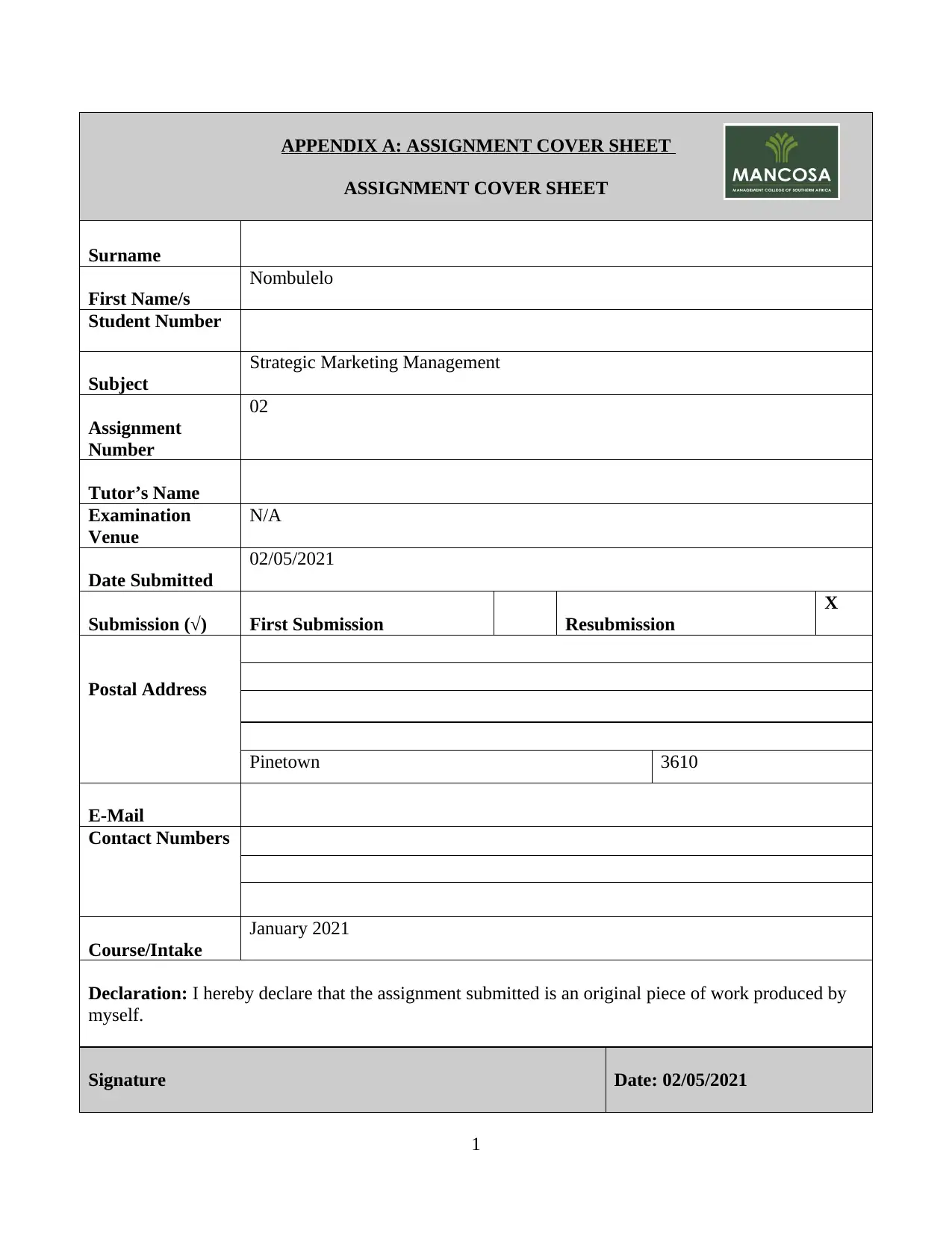
APPENDIX A: ASSIGNMENT COVER SHEET
ASSIGNMENT COVER SHEET
Surname
First Name/s
Nombulelo
Student Number
Subject
Strategic Marketing Management
Assignment
Number
02
Tutor’s Name
Examination
Venue
N/A
Date Submitted
02/05/2021
Submission (√) First Submission Resubmission
X
Postal Address
Pinetown 3610
E-Mail
Contact Numbers
Course/Intake
January 2021
Declaration: I hereby declare that the assignment submitted is an original piece of work produced by
myself.
Signature Date: 02/05/2021
1
ASSIGNMENT COVER SHEET
Surname
First Name/s
Nombulelo
Student Number
Subject
Strategic Marketing Management
Assignment
Number
02
Tutor’s Name
Examination
Venue
N/A
Date Submitted
02/05/2021
Submission (√) First Submission Resubmission
X
Postal Address
Pinetown 3610
Contact Numbers
Course/Intake
January 2021
Declaration: I hereby declare that the assignment submitted is an original piece of work produced by
myself.
Signature Date: 02/05/2021
1
Paraphrase This Document
Need a fresh take? Get an instant paraphrase of this document with our AI Paraphraser
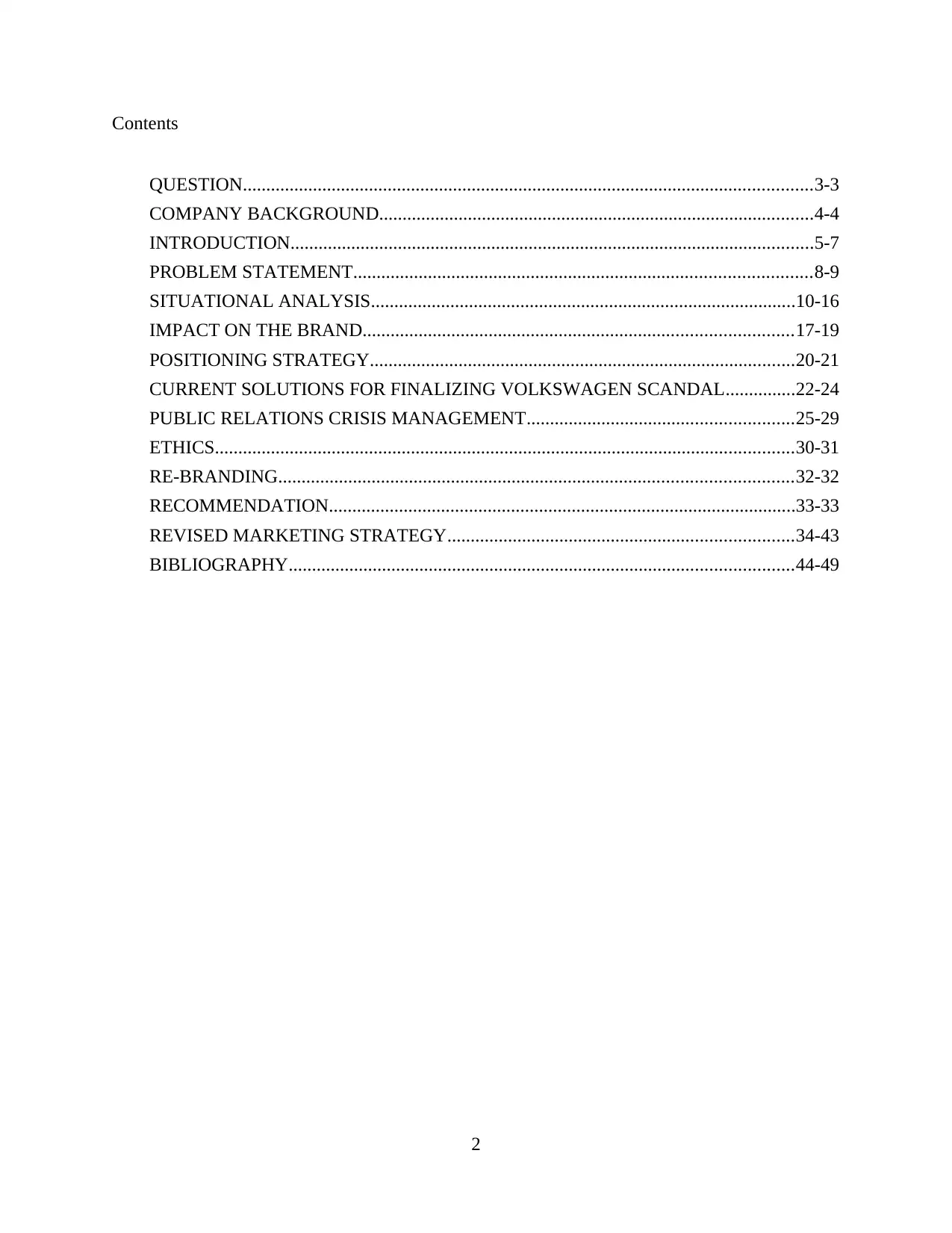
Contents
QUESTION..........................................................................................................................3-3
COMPANY BACKGROUND.............................................................................................4-4
INTRODUCTION................................................................................................................5-7
PROBLEM STATEMENT..................................................................................................8-9
SITUATIONAL ANALYSIS...........................................................................................10-16
IMPACT ON THE BRAND............................................................................................17-19
POSITIONING STRATEGY...........................................................................................20-21
CURRENT SOLUTIONS FOR FINALIZING VOLKSWAGEN SCANDAL...............22-24
PUBLIC RELATIONS CRISIS MANAGEMENT.........................................................25-29
ETHICS............................................................................................................................30-31
RE-BRANDING..............................................................................................................32-32
RECOMMENDATION....................................................................................................33-33
REVISED MARKETING STRATEGY..........................................................................34-43
BIBLIOGRAPHY............................................................................................................44-49
2
QUESTION..........................................................................................................................3-3
COMPANY BACKGROUND.............................................................................................4-4
INTRODUCTION................................................................................................................5-7
PROBLEM STATEMENT..................................................................................................8-9
SITUATIONAL ANALYSIS...........................................................................................10-16
IMPACT ON THE BRAND............................................................................................17-19
POSITIONING STRATEGY...........................................................................................20-21
CURRENT SOLUTIONS FOR FINALIZING VOLKSWAGEN SCANDAL...............22-24
PUBLIC RELATIONS CRISIS MANAGEMENT.........................................................25-29
ETHICS............................................................................................................................30-31
RE-BRANDING..............................................................................................................32-32
RECOMMENDATION....................................................................................................33-33
REVISED MARKETING STRATEGY..........................................................................34-43
BIBLIOGRAPHY............................................................................................................44-49
2
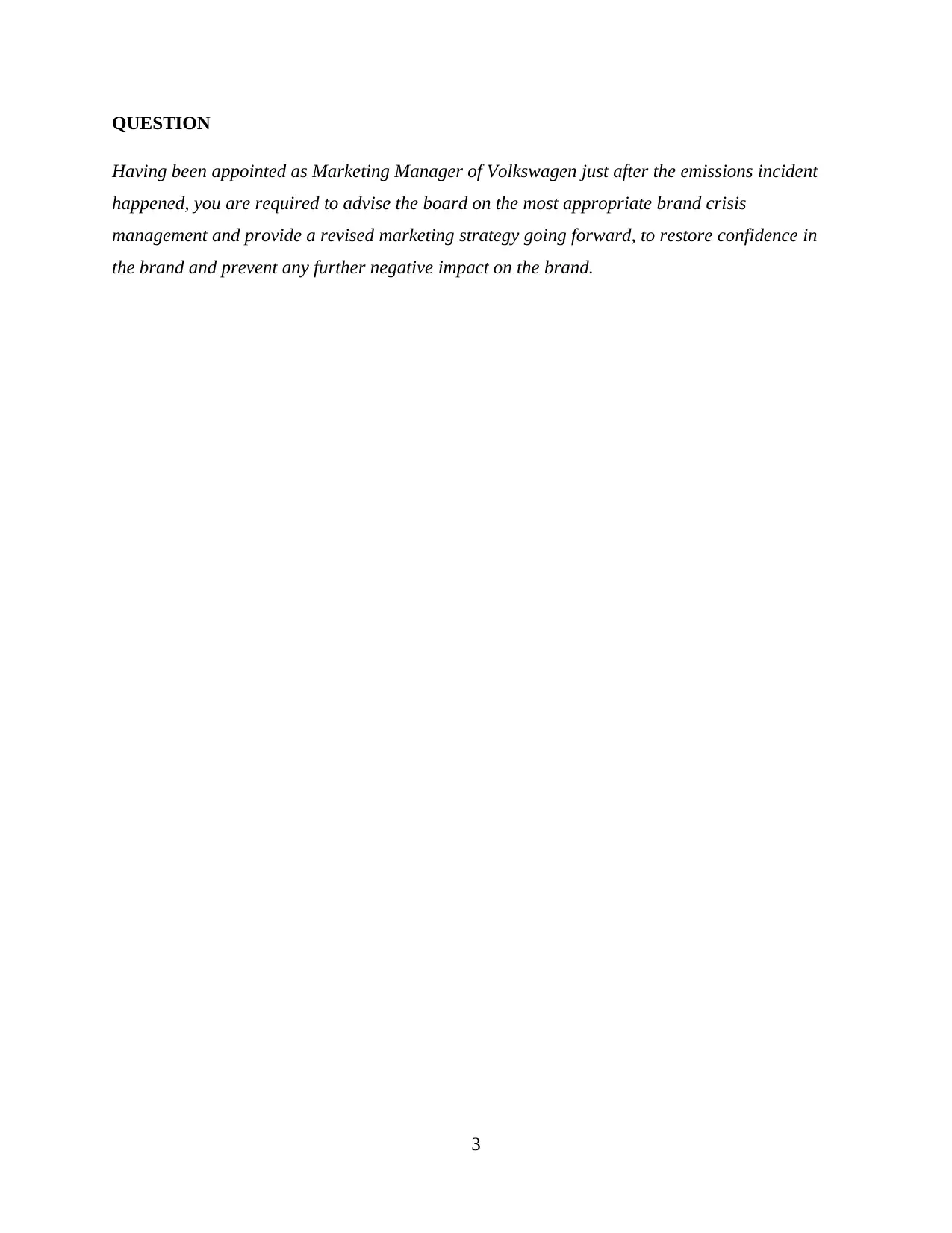
QUESTION
Having been appointed as Marketing Manager of Volkswagen just after the emissions incident
happened, you are required to advise the board on the most appropriate brand crisis
management and provide a revised marketing strategy going forward, to restore confidence in
the brand and prevent any further negative impact on the brand.
3
Having been appointed as Marketing Manager of Volkswagen just after the emissions incident
happened, you are required to advise the board on the most appropriate brand crisis
management and provide a revised marketing strategy going forward, to restore confidence in
the brand and prevent any further negative impact on the brand.
3
⊘ This is a preview!⊘
Do you want full access?
Subscribe today to unlock all pages.

Trusted by 1+ million students worldwide
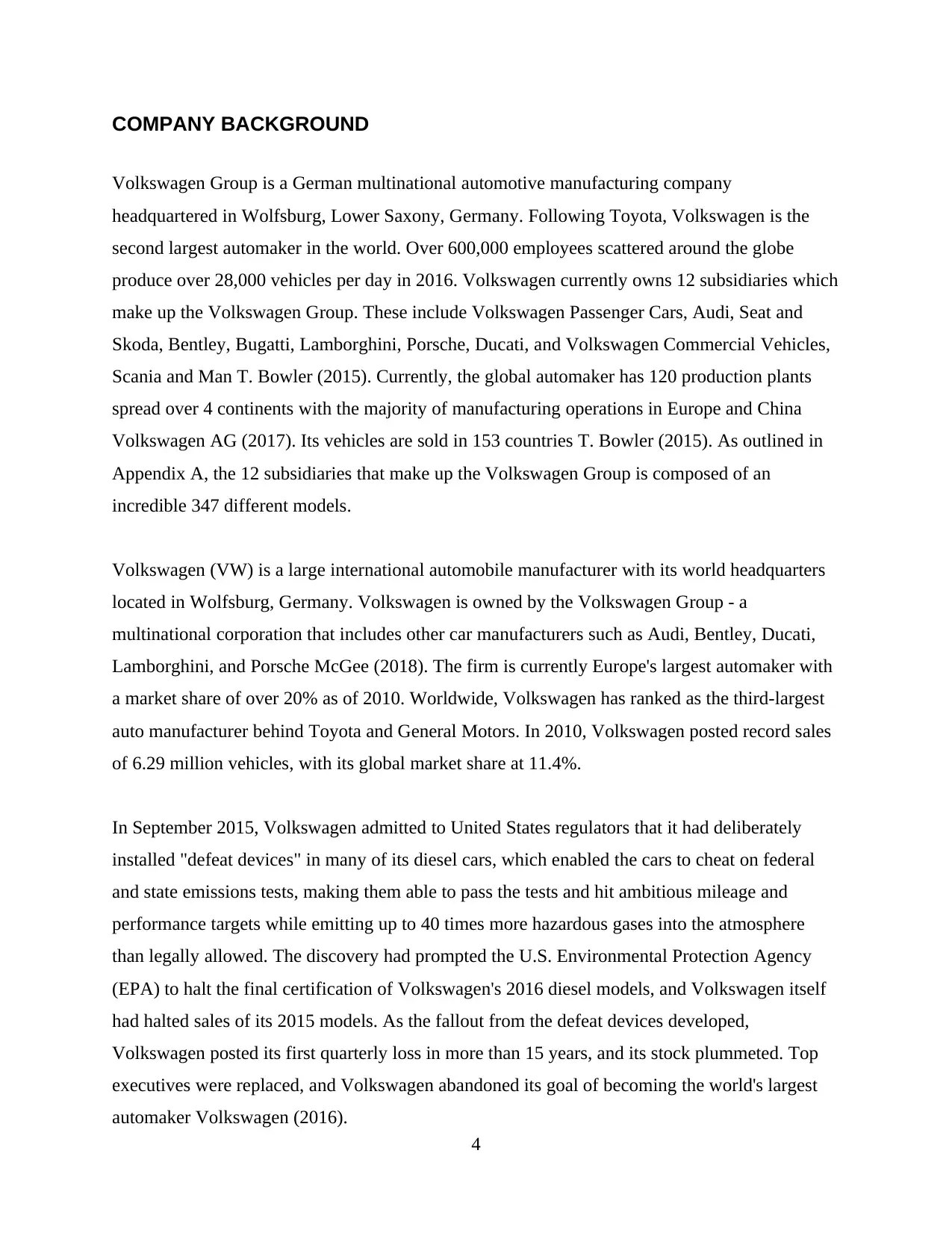
COMPANY BACKGROUND
Volkswagen Group is a German multinational automotive manufacturing company
headquartered in Wolfsburg, Lower Saxony, Germany. Following Toyota, Volkswagen is the
second largest automaker in the world. Over 600,000 employees scattered around the globe
produce over 28,000 vehicles per day in 2016. Volkswagen currently owns 12 subsidiaries which
make up the Volkswagen Group. These include Volkswagen Passenger Cars, Audi, Seat and
Skoda, Bentley, Bugatti, Lamborghini, Porsche, Ducati, and Volkswagen Commercial Vehicles,
Scania and Man T. Bowler (2015). Currently, the global automaker has 120 production plants
spread over 4 continents with the majority of manufacturing operations in Europe and China
Volkswagen AG (2017). Its vehicles are sold in 153 countries T. Bowler (2015). As outlined in
Appendix A, the 12 subsidiaries that make up the Volkswagen Group is composed of an
incredible 347 different models.
Volkswagen (VW) is a large international automobile manufacturer with its world headquarters
located in Wolfsburg, Germany. Volkswagen is owned by the Volkswagen Group - a
multinational corporation that includes other car manufacturers such as Audi, Bentley, Ducati,
Lamborghini, and Porsche McGee (2018). The firm is currently Europe's largest automaker with
a market share of over 20% as of 2010. Worldwide, Volkswagen has ranked as the third-largest
auto manufacturer behind Toyota and General Motors. In 2010, Volkswagen posted record sales
of 6.29 million vehicles, with its global market share at 11.4%.
In September 2015, Volkswagen admitted to United States regulators that it had deliberately
installed "defeat devices" in many of its diesel cars, which enabled the cars to cheat on federal
and state emissions tests, making them able to pass the tests and hit ambitious mileage and
performance targets while emitting up to 40 times more hazardous gases into the atmosphere
than legally allowed. The discovery had prompted the U.S. Environmental Protection Agency
(EPA) to halt the final certification of Volkswagen's 2016 diesel models, and Volkswagen itself
had halted sales of its 2015 models. As the fallout from the defeat devices developed,
Volkswagen posted its first quarterly loss in more than 15 years, and its stock plummeted. Top
executives were replaced, and Volkswagen abandoned its goal of becoming the world's largest
automaker Volkswagen (2016).
4
Volkswagen Group is a German multinational automotive manufacturing company
headquartered in Wolfsburg, Lower Saxony, Germany. Following Toyota, Volkswagen is the
second largest automaker in the world. Over 600,000 employees scattered around the globe
produce over 28,000 vehicles per day in 2016. Volkswagen currently owns 12 subsidiaries which
make up the Volkswagen Group. These include Volkswagen Passenger Cars, Audi, Seat and
Skoda, Bentley, Bugatti, Lamborghini, Porsche, Ducati, and Volkswagen Commercial Vehicles,
Scania and Man T. Bowler (2015). Currently, the global automaker has 120 production plants
spread over 4 continents with the majority of manufacturing operations in Europe and China
Volkswagen AG (2017). Its vehicles are sold in 153 countries T. Bowler (2015). As outlined in
Appendix A, the 12 subsidiaries that make up the Volkswagen Group is composed of an
incredible 347 different models.
Volkswagen (VW) is a large international automobile manufacturer with its world headquarters
located in Wolfsburg, Germany. Volkswagen is owned by the Volkswagen Group - a
multinational corporation that includes other car manufacturers such as Audi, Bentley, Ducati,
Lamborghini, and Porsche McGee (2018). The firm is currently Europe's largest automaker with
a market share of over 20% as of 2010. Worldwide, Volkswagen has ranked as the third-largest
auto manufacturer behind Toyota and General Motors. In 2010, Volkswagen posted record sales
of 6.29 million vehicles, with its global market share at 11.4%.
In September 2015, Volkswagen admitted to United States regulators that it had deliberately
installed "defeat devices" in many of its diesel cars, which enabled the cars to cheat on federal
and state emissions tests, making them able to pass the tests and hit ambitious mileage and
performance targets while emitting up to 40 times more hazardous gases into the atmosphere
than legally allowed. The discovery had prompted the U.S. Environmental Protection Agency
(EPA) to halt the final certification of Volkswagen's 2016 diesel models, and Volkswagen itself
had halted sales of its 2015 models. As the fallout from the defeat devices developed,
Volkswagen posted its first quarterly loss in more than 15 years, and its stock plummeted. Top
executives were replaced, and Volkswagen abandoned its goal of becoming the world's largest
automaker Volkswagen (2016).
4
Paraphrase This Document
Need a fresh take? Get an instant paraphrase of this document with our AI Paraphraser
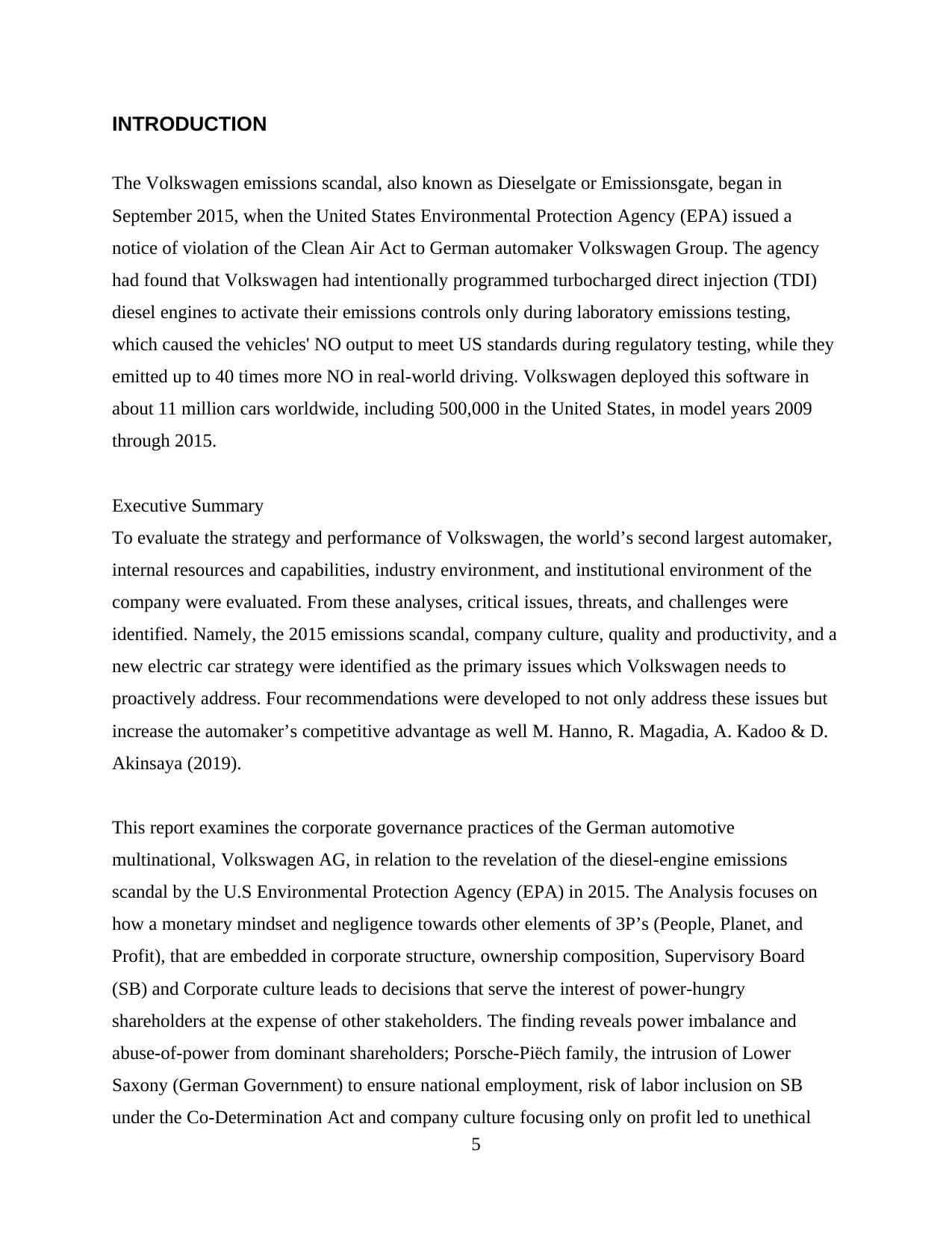
INTRODUCTION
The Volkswagen emissions scandal, also known as Dieselgate or Emissionsgate, began in
September 2015, when the United States Environmental Protection Agency (EPA) issued a
notice of violation of the Clean Air Act to German automaker Volkswagen Group. The agency
had found that Volkswagen had intentionally programmed turbocharged direct injection (TDI)
diesel engines to activate their emissions controls only during laboratory emissions testing,
which caused the vehicles' NO output to meet US standards during regulatory testing, while they
emitted up to 40 times more NO in real-world driving. Volkswagen deployed this software in
about 11 million cars worldwide, including 500,000 in the United States, in model years 2009
through 2015.
Executive Summary
To evaluate the strategy and performance of Volkswagen, the world’s second largest automaker,
internal resources and capabilities, industry environment, and institutional environment of the
company were evaluated. From these analyses, critical issues, threats, and challenges were
identified. Namely, the 2015 emissions scandal, company culture, quality and productivity, and a
new electric car strategy were identified as the primary issues which Volkswagen needs to
proactively address. Four recommendations were developed to not only address these issues but
increase the automaker’s competitive advantage as well M. Hanno, R. Magadia, A. Kadoo & D.
Akinsaya (2019).
This report examines the corporate governance practices of the German automotive
multinational, Volkswagen AG, in relation to the revelation of the diesel-engine emissions
scandal by the U.S Environmental Protection Agency (EPA) in 2015. The Analysis focuses on
how a monetary mindset and negligence towards other elements of 3P’s (People, Planet, and
Profit), that are embedded in corporate structure, ownership composition, Supervisory Board
(SB) and Corporate culture leads to decisions that serve the interest of power-hungry
shareholders at the expense of other stakeholders. The finding reveals power imbalance and
abuse-of-power from dominant shareholders; Porsche-Piëch family, the intrusion of Lower
Saxony (German Government) to ensure national employment, risk of labor inclusion on SB
under the Co-Determination Act and company culture focusing only on profit led to unethical
5
The Volkswagen emissions scandal, also known as Dieselgate or Emissionsgate, began in
September 2015, when the United States Environmental Protection Agency (EPA) issued a
notice of violation of the Clean Air Act to German automaker Volkswagen Group. The agency
had found that Volkswagen had intentionally programmed turbocharged direct injection (TDI)
diesel engines to activate their emissions controls only during laboratory emissions testing,
which caused the vehicles' NO output to meet US standards during regulatory testing, while they
emitted up to 40 times more NO in real-world driving. Volkswagen deployed this software in
about 11 million cars worldwide, including 500,000 in the United States, in model years 2009
through 2015.
Executive Summary
To evaluate the strategy and performance of Volkswagen, the world’s second largest automaker,
internal resources and capabilities, industry environment, and institutional environment of the
company were evaluated. From these analyses, critical issues, threats, and challenges were
identified. Namely, the 2015 emissions scandal, company culture, quality and productivity, and a
new electric car strategy were identified as the primary issues which Volkswagen needs to
proactively address. Four recommendations were developed to not only address these issues but
increase the automaker’s competitive advantage as well M. Hanno, R. Magadia, A. Kadoo & D.
Akinsaya (2019).
This report examines the corporate governance practices of the German automotive
multinational, Volkswagen AG, in relation to the revelation of the diesel-engine emissions
scandal by the U.S Environmental Protection Agency (EPA) in 2015. The Analysis focuses on
how a monetary mindset and negligence towards other elements of 3P’s (People, Planet, and
Profit), that are embedded in corporate structure, ownership composition, Supervisory Board
(SB) and Corporate culture leads to decisions that serve the interest of power-hungry
shareholders at the expense of other stakeholders. The finding reveals power imbalance and
abuse-of-power from dominant shareholders; Porsche-Piëch family, the intrusion of Lower
Saxony (German Government) to ensure national employment, risk of labor inclusion on SB
under the Co-Determination Act and company culture focusing only on profit led to unethical
5
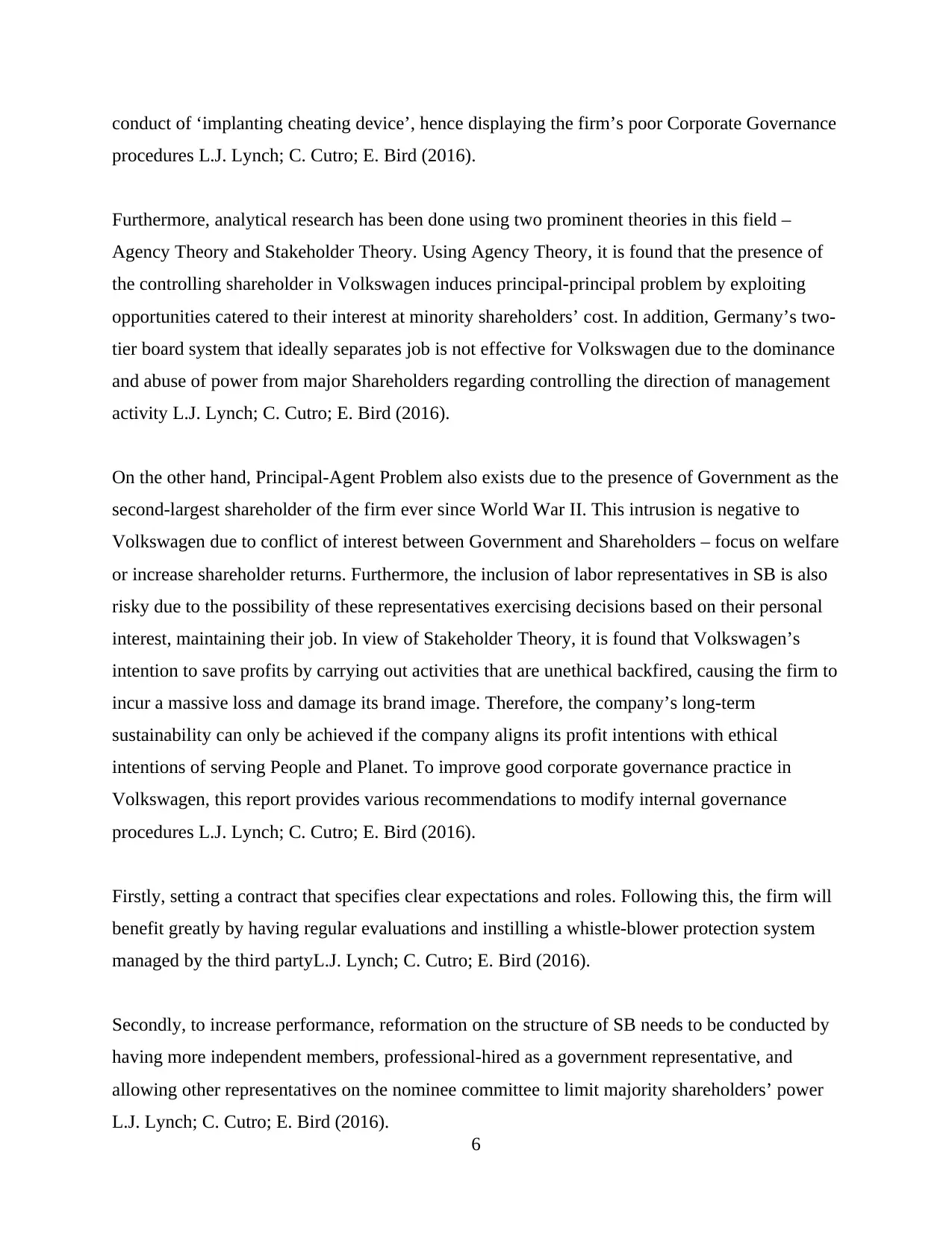
conduct of ‘implanting cheating device’, hence displaying the firm’s poor Corporate Governance
procedures L.J. Lynch; C. Cutro; E. Bird (2016).
Furthermore, analytical research has been done using two prominent theories in this field –
Agency Theory and Stakeholder Theory. Using Agency Theory, it is found that the presence of
the controlling shareholder in Volkswagen induces principal-principal problem by exploiting
opportunities catered to their interest at minority shareholders’ cost. In addition, Germany’s two-
tier board system that ideally separates job is not effective for Volkswagen due to the dominance
and abuse of power from major Shareholders regarding controlling the direction of management
activity L.J. Lynch; C. Cutro; E. Bird (2016).
On the other hand, Principal-Agent Problem also exists due to the presence of Government as the
second-largest shareholder of the firm ever since World War II. This intrusion is negative to
Volkswagen due to conflict of interest between Government and Shareholders – focus on welfare
or increase shareholder returns. Furthermore, the inclusion of labor representatives in SB is also
risky due to the possibility of these representatives exercising decisions based on their personal
interest, maintaining their job. In view of Stakeholder Theory, it is found that Volkswagen’s
intention to save profits by carrying out activities that are unethical backfired, causing the firm to
incur a massive loss and damage its brand image. Therefore, the company’s long-term
sustainability can only be achieved if the company aligns its profit intentions with ethical
intentions of serving People and Planet. To improve good corporate governance practice in
Volkswagen, this report provides various recommendations to modify internal governance
procedures L.J. Lynch; C. Cutro; E. Bird (2016).
Firstly, setting a contract that specifies clear expectations and roles. Following this, the firm will
benefit greatly by having regular evaluations and instilling a whistle-blower protection system
managed by the third partyL.J. Lynch; C. Cutro; E. Bird (2016).
Secondly, to increase performance, reformation on the structure of SB needs to be conducted by
having more independent members, professional-hired as a government representative, and
allowing other representatives on the nominee committee to limit majority shareholders’ power
L.J. Lynch; C. Cutro; E. Bird (2016).
6
procedures L.J. Lynch; C. Cutro; E. Bird (2016).
Furthermore, analytical research has been done using two prominent theories in this field –
Agency Theory and Stakeholder Theory. Using Agency Theory, it is found that the presence of
the controlling shareholder in Volkswagen induces principal-principal problem by exploiting
opportunities catered to their interest at minority shareholders’ cost. In addition, Germany’s two-
tier board system that ideally separates job is not effective for Volkswagen due to the dominance
and abuse of power from major Shareholders regarding controlling the direction of management
activity L.J. Lynch; C. Cutro; E. Bird (2016).
On the other hand, Principal-Agent Problem also exists due to the presence of Government as the
second-largest shareholder of the firm ever since World War II. This intrusion is negative to
Volkswagen due to conflict of interest between Government and Shareholders – focus on welfare
or increase shareholder returns. Furthermore, the inclusion of labor representatives in SB is also
risky due to the possibility of these representatives exercising decisions based on their personal
interest, maintaining their job. In view of Stakeholder Theory, it is found that Volkswagen’s
intention to save profits by carrying out activities that are unethical backfired, causing the firm to
incur a massive loss and damage its brand image. Therefore, the company’s long-term
sustainability can only be achieved if the company aligns its profit intentions with ethical
intentions of serving People and Planet. To improve good corporate governance practice in
Volkswagen, this report provides various recommendations to modify internal governance
procedures L.J. Lynch; C. Cutro; E. Bird (2016).
Firstly, setting a contract that specifies clear expectations and roles. Following this, the firm will
benefit greatly by having regular evaluations and instilling a whistle-blower protection system
managed by the third partyL.J. Lynch; C. Cutro; E. Bird (2016).
Secondly, to increase performance, reformation on the structure of SB needs to be conducted by
having more independent members, professional-hired as a government representative, and
allowing other representatives on the nominee committee to limit majority shareholders’ power
L.J. Lynch; C. Cutro; E. Bird (2016).
6
⊘ This is a preview!⊘
Do you want full access?
Subscribe today to unlock all pages.

Trusted by 1+ million students worldwide
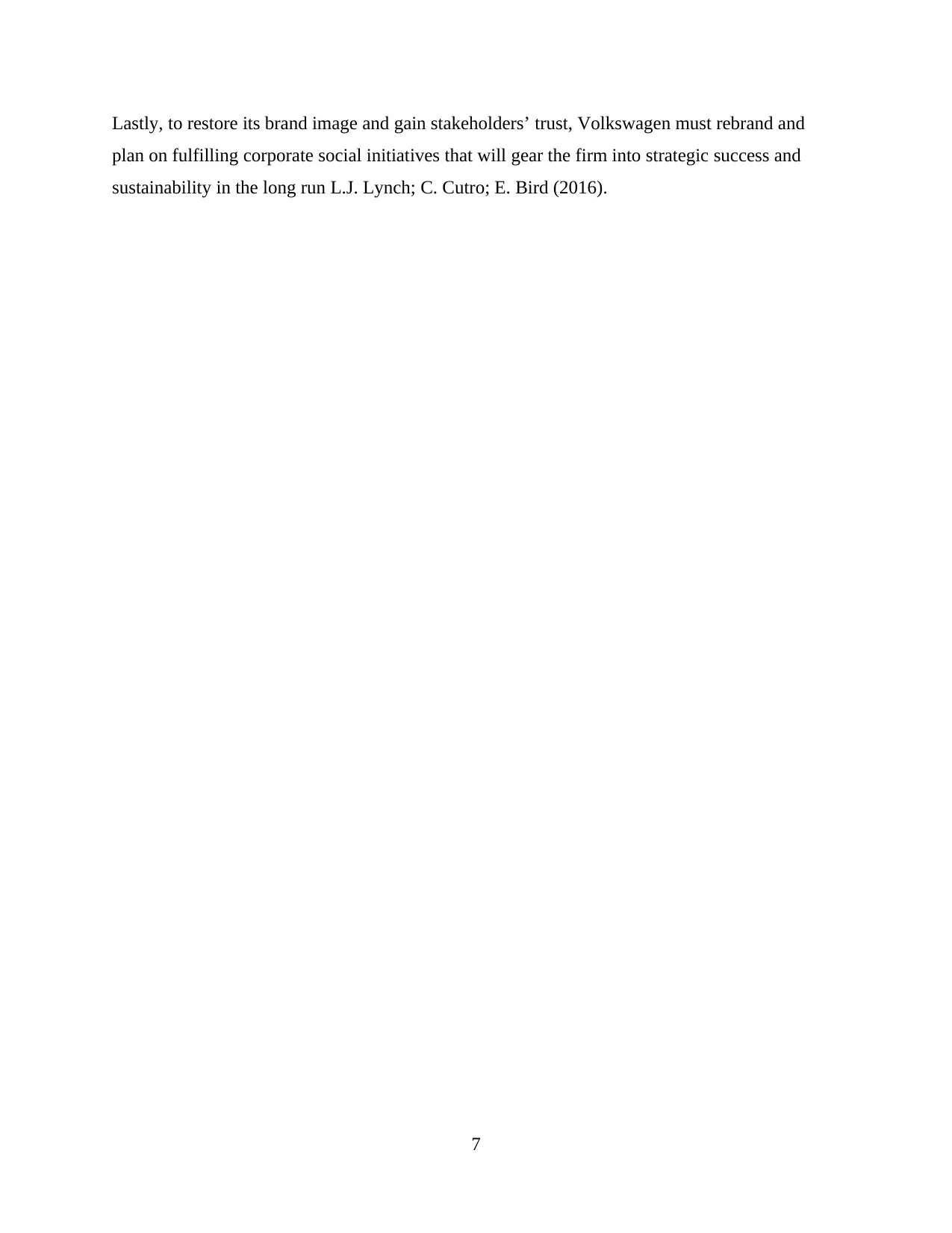
Lastly, to restore its brand image and gain stakeholders’ trust, Volkswagen must rebrand and
plan on fulfilling corporate social initiatives that will gear the firm into strategic success and
sustainability in the long run L.J. Lynch; C. Cutro; E. Bird (2016).
7
plan on fulfilling corporate social initiatives that will gear the firm into strategic success and
sustainability in the long run L.J. Lynch; C. Cutro; E. Bird (2016).
7
Paraphrase This Document
Need a fresh take? Get an instant paraphrase of this document with our AI Paraphraser
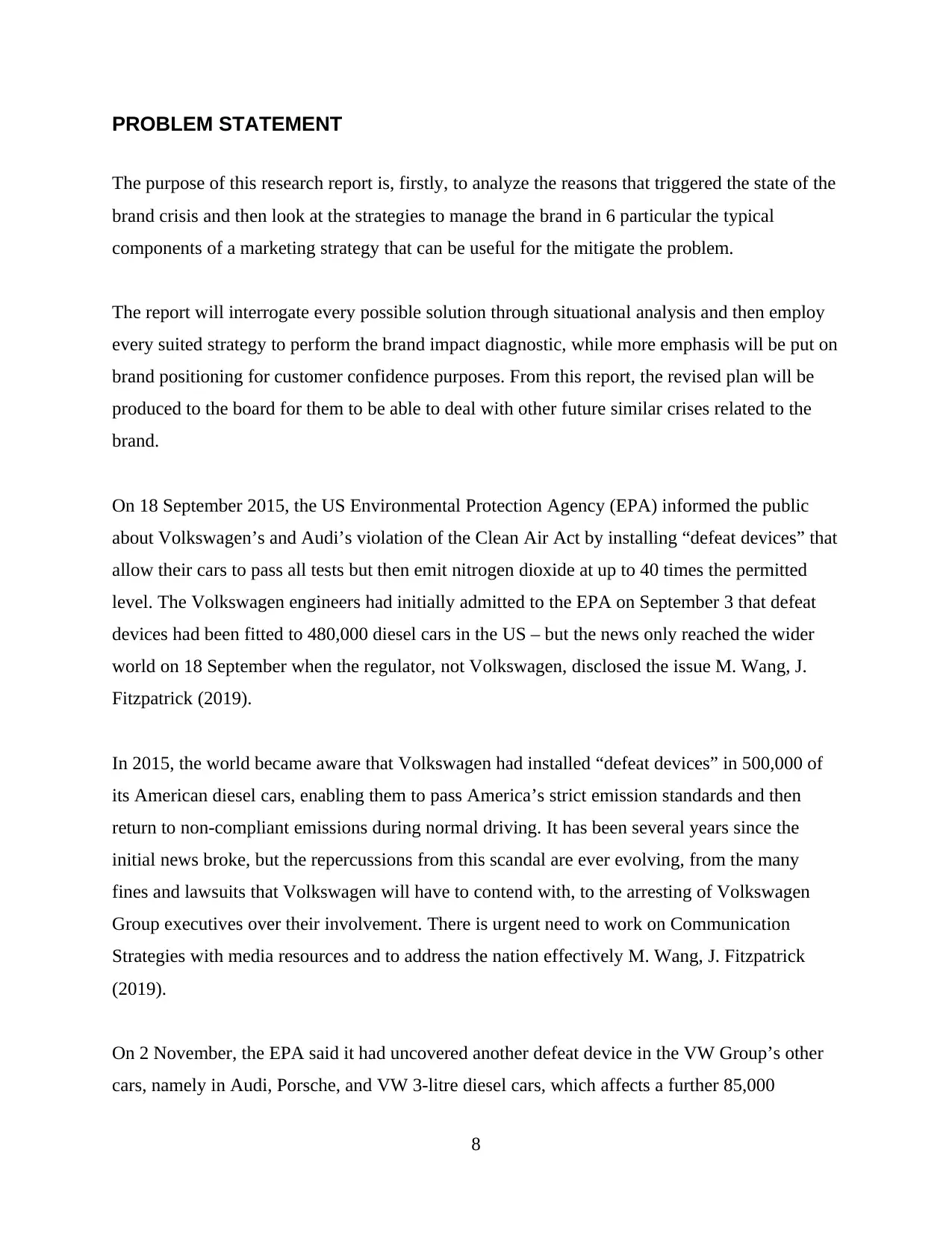
PROBLEM STATEMENT
The purpose of this research report is, firstly, to analyze the reasons that triggered the state of the
brand crisis and then look at the strategies to manage the brand in 6 particular the typical
components of a marketing strategy that can be useful for the mitigate the problem.
The report will interrogate every possible solution through situational analysis and then employ
every suited strategy to perform the brand impact diagnostic, while more emphasis will be put on
brand positioning for customer confidence purposes. From this report, the revised plan will be
produced to the board for them to be able to deal with other future similar crises related to the
brand.
On 18 September 2015, the US Environmental Protection Agency (EPA) informed the public
about Volkswagen’s and Audi’s violation of the Clean Air Act by installing “defeat devices” that
allow their cars to pass all tests but then emit nitrogen dioxide at up to 40 times the permitted
level. The Volkswagen engineers had initially admitted to the EPA on September 3 that defeat
devices had been fitted to 480,000 diesel cars in the US – but the news only reached the wider
world on 18 September when the regulator, not Volkswagen, disclosed the issue M. Wang, J.
Fitzpatrick (2019).
In 2015, the world became aware that Volkswagen had installed “defeat devices” in 500,000 of
its American diesel cars, enabling them to pass America’s strict emission standards and then
return to non-compliant emissions during normal driving. It has been several years since the
initial news broke, but the repercussions from this scandal are ever evolving, from the many
fines and lawsuits that Volkswagen will have to contend with, to the arresting of Volkswagen
Group executives over their involvement. There is urgent need to work on Communication
Strategies with media resources and to address the nation effectively M. Wang, J. Fitzpatrick
(2019).
On 2 November, the EPA said it had uncovered another defeat device in the VW Group’s other
cars, namely in Audi, Porsche, and VW 3-litre diesel cars, which affects a further 85,000
8
The purpose of this research report is, firstly, to analyze the reasons that triggered the state of the
brand crisis and then look at the strategies to manage the brand in 6 particular the typical
components of a marketing strategy that can be useful for the mitigate the problem.
The report will interrogate every possible solution through situational analysis and then employ
every suited strategy to perform the brand impact diagnostic, while more emphasis will be put on
brand positioning for customer confidence purposes. From this report, the revised plan will be
produced to the board for them to be able to deal with other future similar crises related to the
brand.
On 18 September 2015, the US Environmental Protection Agency (EPA) informed the public
about Volkswagen’s and Audi’s violation of the Clean Air Act by installing “defeat devices” that
allow their cars to pass all tests but then emit nitrogen dioxide at up to 40 times the permitted
level. The Volkswagen engineers had initially admitted to the EPA on September 3 that defeat
devices had been fitted to 480,000 diesel cars in the US – but the news only reached the wider
world on 18 September when the regulator, not Volkswagen, disclosed the issue M. Wang, J.
Fitzpatrick (2019).
In 2015, the world became aware that Volkswagen had installed “defeat devices” in 500,000 of
its American diesel cars, enabling them to pass America’s strict emission standards and then
return to non-compliant emissions during normal driving. It has been several years since the
initial news broke, but the repercussions from this scandal are ever evolving, from the many
fines and lawsuits that Volkswagen will have to contend with, to the arresting of Volkswagen
Group executives over their involvement. There is urgent need to work on Communication
Strategies with media resources and to address the nation effectively M. Wang, J. Fitzpatrick
(2019).
On 2 November, the EPA said it had uncovered another defeat device in the VW Group’s other
cars, namely in Audi, Porsche, and VW 3-litre diesel cars, which affects a further 85,000
8
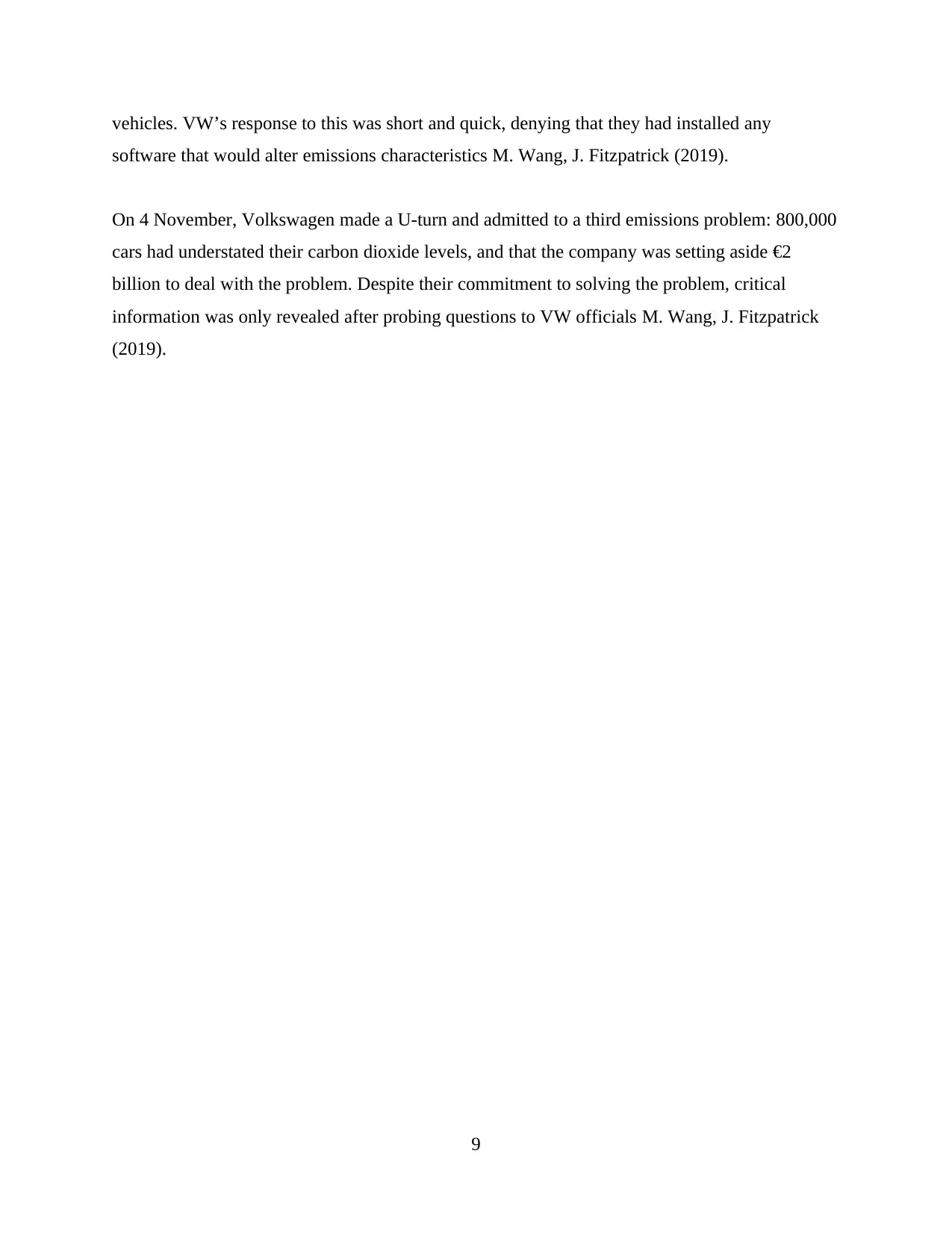
vehicles. VW’s response to this was short and quick, denying that they had installed any
software that would alter emissions characteristics M. Wang, J. Fitzpatrick (2019).
On 4 November, Volkswagen made a U-turn and admitted to a third emissions problem: 800,000
cars had understated their carbon dioxide levels, and that the company was setting aside €2
billion to deal with the problem. Despite their commitment to solving the problem, critical
information was only revealed after probing questions to VW officials M. Wang, J. Fitzpatrick
(2019).
9
software that would alter emissions characteristics M. Wang, J. Fitzpatrick (2019).
On 4 November, Volkswagen made a U-turn and admitted to a third emissions problem: 800,000
cars had understated their carbon dioxide levels, and that the company was setting aside €2
billion to deal with the problem. Despite their commitment to solving the problem, critical
information was only revealed after probing questions to VW officials M. Wang, J. Fitzpatrick
(2019).
9
⊘ This is a preview!⊘
Do you want full access?
Subscribe today to unlock all pages.

Trusted by 1+ million students worldwide
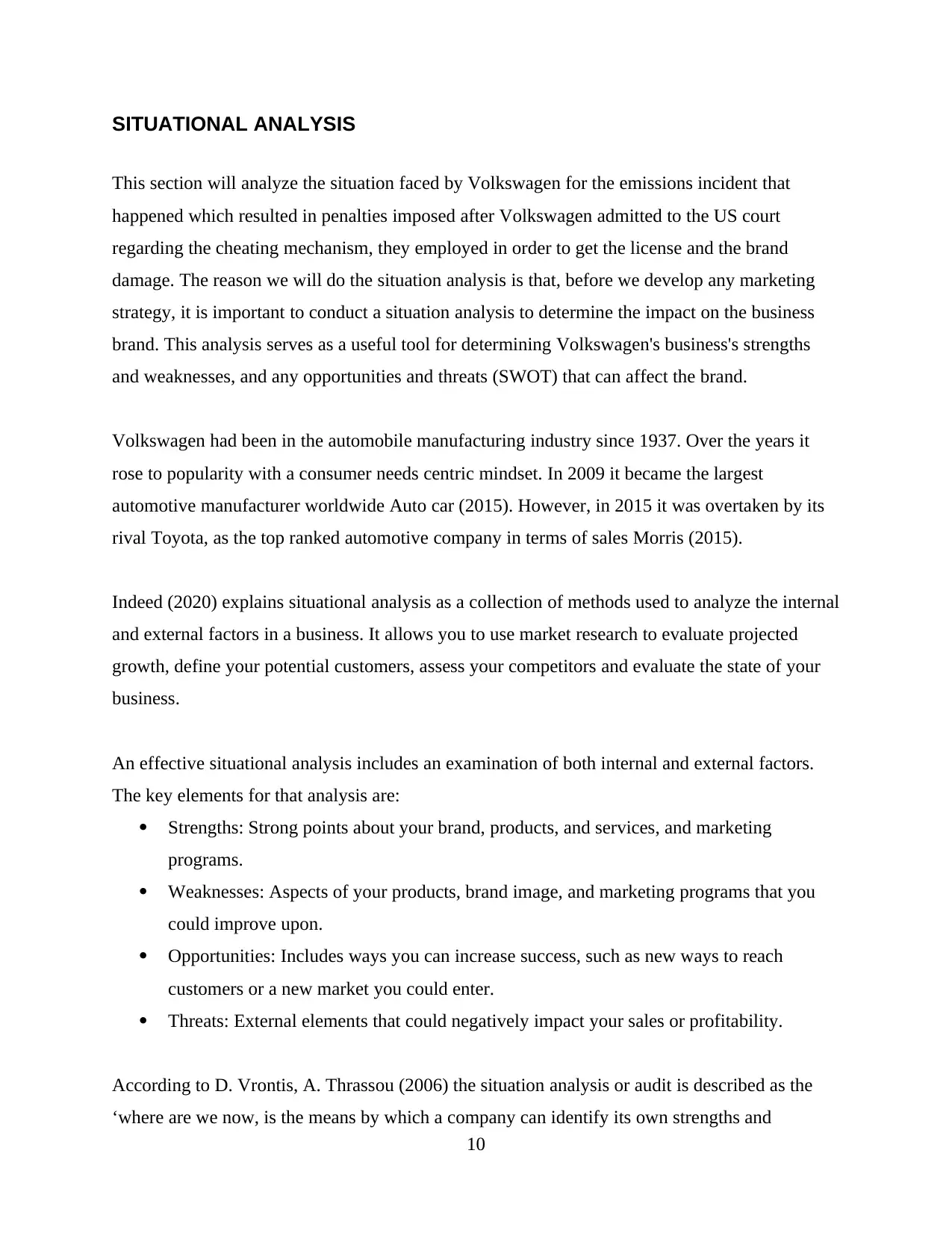
SITUATIONAL ANALYSIS
This section will analyze the situation faced by Volkswagen for the emissions incident that
happened which resulted in penalties imposed after Volkswagen admitted to the US court
regarding the cheating mechanism, they employed in order to get the license and the brand
damage. The reason we will do the situation analysis is that, before we develop any marketing
strategy, it is important to conduct a situation analysis to determine the impact on the business
brand. This analysis serves as a useful tool for determining Volkswagen's business's strengths
and weaknesses, and any opportunities and threats (SWOT) that can affect the brand.
Volkswagen had been in the automobile manufacturing industry since 1937. Over the years it
rose to popularity with a consumer needs centric mindset. In 2009 it became the largest
automotive manufacturer worldwide Auto car (2015). However, in 2015 it was overtaken by its
rival Toyota, as the top ranked automotive company in terms of sales Morris (2015).
Indeed (2020) explains situational analysis as a collection of methods used to analyze the internal
and external factors in a business. It allows you to use market research to evaluate projected
growth, define your potential customers, assess your competitors and evaluate the state of your
business.
An effective situational analysis includes an examination of both internal and external factors.
The key elements for that analysis are:
Strengths: Strong points about your brand, products, and services, and marketing
programs.
Weaknesses: Aspects of your products, brand image, and marketing programs that you
could improve upon.
Opportunities: Includes ways you can increase success, such as new ways to reach
customers or a new market you could enter.
Threats: External elements that could negatively impact your sales or profitability.
According to D. Vrontis, A. Thrassou (2006) the situation analysis or audit is described as the
‘where are we now, is the means by which a company can identify its own strengths and
10
This section will analyze the situation faced by Volkswagen for the emissions incident that
happened which resulted in penalties imposed after Volkswagen admitted to the US court
regarding the cheating mechanism, they employed in order to get the license and the brand
damage. The reason we will do the situation analysis is that, before we develop any marketing
strategy, it is important to conduct a situation analysis to determine the impact on the business
brand. This analysis serves as a useful tool for determining Volkswagen's business's strengths
and weaknesses, and any opportunities and threats (SWOT) that can affect the brand.
Volkswagen had been in the automobile manufacturing industry since 1937. Over the years it
rose to popularity with a consumer needs centric mindset. In 2009 it became the largest
automotive manufacturer worldwide Auto car (2015). However, in 2015 it was overtaken by its
rival Toyota, as the top ranked automotive company in terms of sales Morris (2015).
Indeed (2020) explains situational analysis as a collection of methods used to analyze the internal
and external factors in a business. It allows you to use market research to evaluate projected
growth, define your potential customers, assess your competitors and evaluate the state of your
business.
An effective situational analysis includes an examination of both internal and external factors.
The key elements for that analysis are:
Strengths: Strong points about your brand, products, and services, and marketing
programs.
Weaknesses: Aspects of your products, brand image, and marketing programs that you
could improve upon.
Opportunities: Includes ways you can increase success, such as new ways to reach
customers or a new market you could enter.
Threats: External elements that could negatively impact your sales or profitability.
According to D. Vrontis, A. Thrassou (2006) the situation analysis or audit is described as the
‘where are we now, is the means by which a company can identify its own strengths and
10
Paraphrase This Document
Need a fresh take? Get an instant paraphrase of this document with our AI Paraphraser
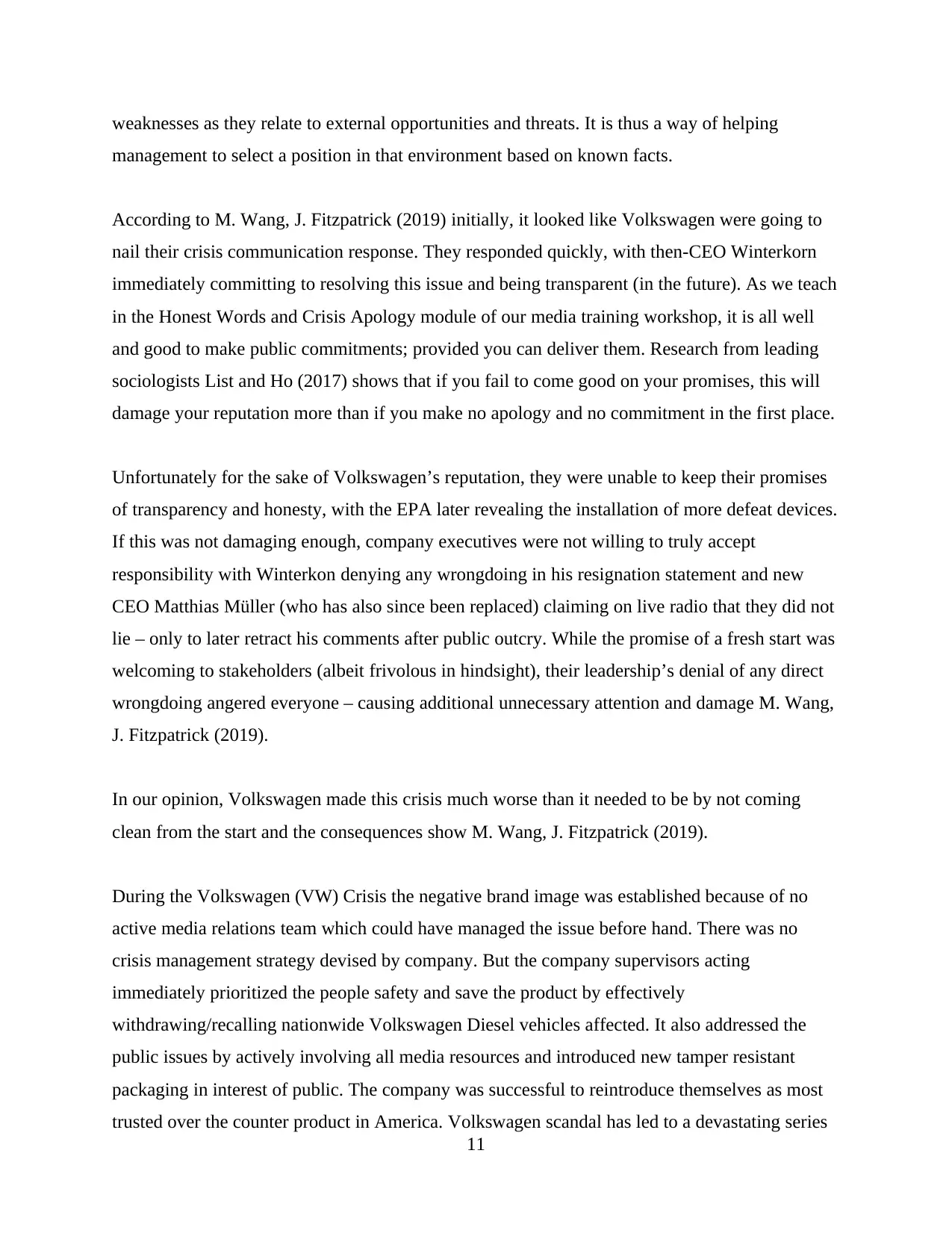
weaknesses as they relate to external opportunities and threats. It is thus a way of helping
management to select a position in that environment based on known facts.
According to M. Wang, J. Fitzpatrick (2019) initially, it looked like Volkswagen were going to
nail their crisis communication response. They responded quickly, with then-CEO Winterkorn
immediately committing to resolving this issue and being transparent (in the future). As we teach
in the Honest Words and Crisis Apology module of our media training workshop, it is all well
and good to make public commitments; provided you can deliver them. Research from leading
sociologists List and Ho (2017) shows that if you fail to come good on your promises, this will
damage your reputation more than if you make no apology and no commitment in the first place.
Unfortunately for the sake of Volkswagen’s reputation, they were unable to keep their promises
of transparency and honesty, with the EPA later revealing the installation of more defeat devices.
If this was not damaging enough, company executives were not willing to truly accept
responsibility with Winterkon denying any wrongdoing in his resignation statement and new
CEO Matthias Müller (who has also since been replaced) claiming on live radio that they did not
lie – only to later retract his comments after public outcry. While the promise of a fresh start was
welcoming to stakeholders (albeit frivolous in hindsight), their leadership’s denial of any direct
wrongdoing angered everyone – causing additional unnecessary attention and damage M. Wang,
J. Fitzpatrick (2019).
In our opinion, Volkswagen made this crisis much worse than it needed to be by not coming
clean from the start and the consequences show M. Wang, J. Fitzpatrick (2019).
During the Volkswagen (VW) Crisis the negative brand image was established because of no
active media relations team which could have managed the issue before hand. There was no
crisis management strategy devised by company. But the company supervisors acting
immediately prioritized the people safety and save the product by effectively
withdrawing/recalling nationwide Volkswagen Diesel vehicles affected. It also addressed the
public issues by actively involving all media resources and introduced new tamper resistant
packaging in interest of public. The company was successful to reintroduce themselves as most
trusted over the counter product in America. Volkswagen scandal has led to a devastating series
11
management to select a position in that environment based on known facts.
According to M. Wang, J. Fitzpatrick (2019) initially, it looked like Volkswagen were going to
nail their crisis communication response. They responded quickly, with then-CEO Winterkorn
immediately committing to resolving this issue and being transparent (in the future). As we teach
in the Honest Words and Crisis Apology module of our media training workshop, it is all well
and good to make public commitments; provided you can deliver them. Research from leading
sociologists List and Ho (2017) shows that if you fail to come good on your promises, this will
damage your reputation more than if you make no apology and no commitment in the first place.
Unfortunately for the sake of Volkswagen’s reputation, they were unable to keep their promises
of transparency and honesty, with the EPA later revealing the installation of more defeat devices.
If this was not damaging enough, company executives were not willing to truly accept
responsibility with Winterkon denying any wrongdoing in his resignation statement and new
CEO Matthias Müller (who has also since been replaced) claiming on live radio that they did not
lie – only to later retract his comments after public outcry. While the promise of a fresh start was
welcoming to stakeholders (albeit frivolous in hindsight), their leadership’s denial of any direct
wrongdoing angered everyone – causing additional unnecessary attention and damage M. Wang,
J. Fitzpatrick (2019).
In our opinion, Volkswagen made this crisis much worse than it needed to be by not coming
clean from the start and the consequences show M. Wang, J. Fitzpatrick (2019).
During the Volkswagen (VW) Crisis the negative brand image was established because of no
active media relations team which could have managed the issue before hand. There was no
crisis management strategy devised by company. But the company supervisors acting
immediately prioritized the people safety and save the product by effectively
withdrawing/recalling nationwide Volkswagen Diesel vehicles affected. It also addressed the
public issues by actively involving all media resources and introduced new tamper resistant
packaging in interest of public. The company was successful to reintroduce themselves as most
trusted over the counter product in America. Volkswagen scandal has led to a devastating series
11
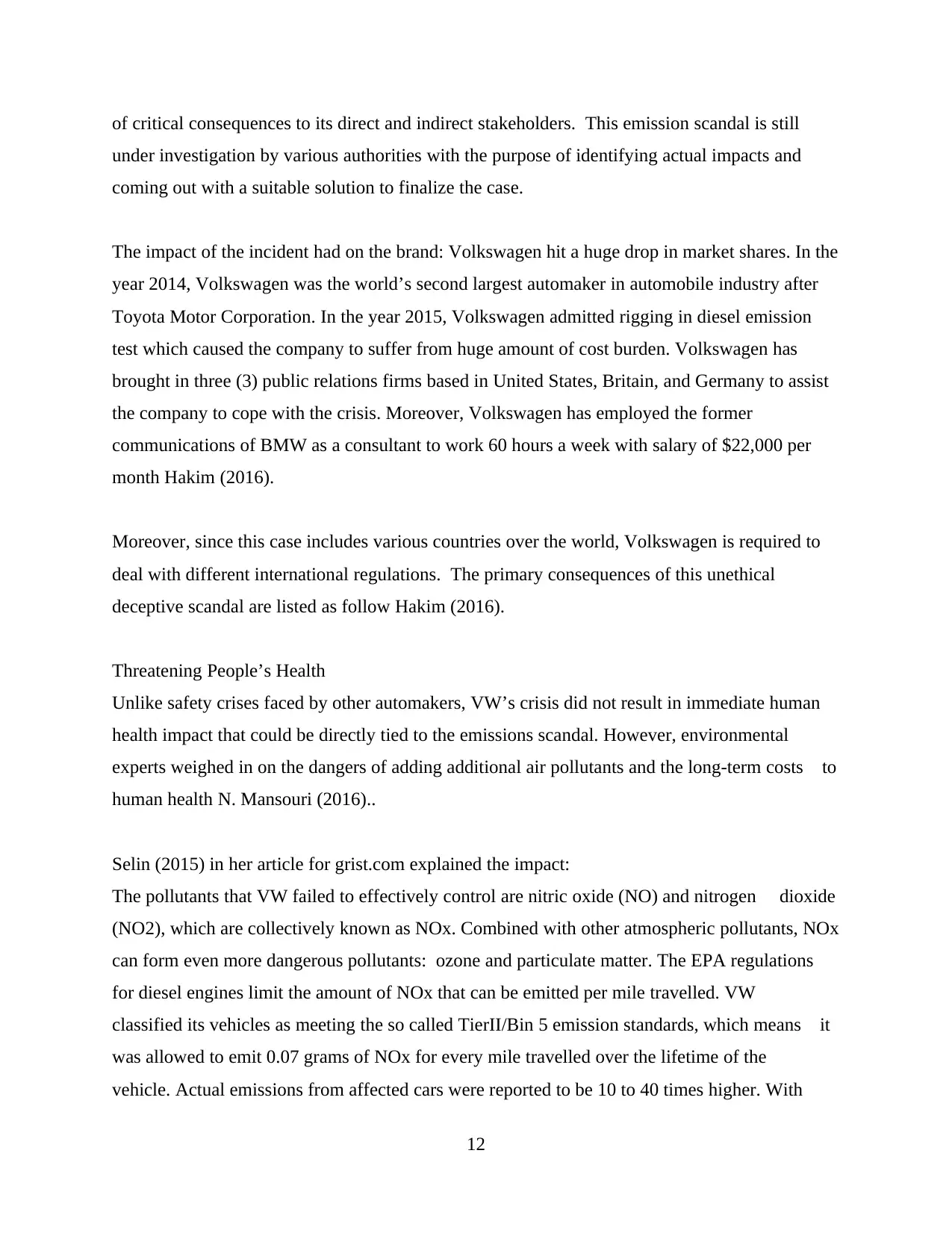
of critical consequences to its direct and indirect stakeholders. This emission scandal is still
under investigation by various authorities with the purpose of identifying actual impacts and
coming out with a suitable solution to finalize the case.
The impact of the incident had on the brand: Volkswagen hit a huge drop in market shares. In the
year 2014, Volkswagen was the world’s second largest automaker in automobile industry after
Toyota Motor Corporation. In the year 2015, Volkswagen admitted rigging in diesel emission
test which caused the company to suffer from huge amount of cost burden. Volkswagen has
brought in three (3) public relations firms based in United States, Britain, and Germany to assist
the company to cope with the crisis. Moreover, Volkswagen has employed the former
communications of BMW as a consultant to work 60 hours a week with salary of $22,000 per
month Hakim (2016).
Moreover, since this case includes various countries over the world, Volkswagen is required to
deal with different international regulations. The primary consequences of this unethical
deceptive scandal are listed as follow Hakim (2016).
Threatening People’s Health
Unlike safety crises faced by other automakers, VW’s crisis did not result in immediate human
health impact that could be directly tied to the emissions scandal. However, environmental
experts weighed in on the dangers of adding additional air pollutants and the long-term costs to
human health N. Mansouri (2016)..
Selin (2015) in her article for grist.com explained the impact:
The pollutants that VW failed to effectively control are nitric oxide (NO) and nitrogen dioxide
(NO2), which are collectively known as NOx. Combined with other atmospheric pollutants, NOx
can form even more dangerous pollutants: ozone and particulate matter. The EPA regulations
for diesel engines limit the amount of NOx that can be emitted per mile travelled. VW
classified its vehicles as meeting the so called TierII/Bin 5 emission standards, which means it
was allowed to emit 0.07 grams of NOx for every mile travelled over the lifetime of the
vehicle. Actual emissions from affected cars were reported to be 10 to 40 times higher. With
12
under investigation by various authorities with the purpose of identifying actual impacts and
coming out with a suitable solution to finalize the case.
The impact of the incident had on the brand: Volkswagen hit a huge drop in market shares. In the
year 2014, Volkswagen was the world’s second largest automaker in automobile industry after
Toyota Motor Corporation. In the year 2015, Volkswagen admitted rigging in diesel emission
test which caused the company to suffer from huge amount of cost burden. Volkswagen has
brought in three (3) public relations firms based in United States, Britain, and Germany to assist
the company to cope with the crisis. Moreover, Volkswagen has employed the former
communications of BMW as a consultant to work 60 hours a week with salary of $22,000 per
month Hakim (2016).
Moreover, since this case includes various countries over the world, Volkswagen is required to
deal with different international regulations. The primary consequences of this unethical
deceptive scandal are listed as follow Hakim (2016).
Threatening People’s Health
Unlike safety crises faced by other automakers, VW’s crisis did not result in immediate human
health impact that could be directly tied to the emissions scandal. However, environmental
experts weighed in on the dangers of adding additional air pollutants and the long-term costs to
human health N. Mansouri (2016)..
Selin (2015) in her article for grist.com explained the impact:
The pollutants that VW failed to effectively control are nitric oxide (NO) and nitrogen dioxide
(NO2), which are collectively known as NOx. Combined with other atmospheric pollutants, NOx
can form even more dangerous pollutants: ozone and particulate matter. The EPA regulations
for diesel engines limit the amount of NOx that can be emitted per mile travelled. VW
classified its vehicles as meeting the so called TierII/Bin 5 emission standards, which means it
was allowed to emit 0.07 grams of NOx for every mile travelled over the lifetime of the
vehicle. Actual emissions from affected cars were reported to be 10 to 40 times higher. With
12
⊘ This is a preview!⊘
Do you want full access?
Subscribe today to unlock all pages.

Trusted by 1+ million students worldwide
1 out of 48
Related Documents
Your All-in-One AI-Powered Toolkit for Academic Success.
+13062052269
info@desklib.com
Available 24*7 on WhatsApp / Email
![[object Object]](/_next/static/media/star-bottom.7253800d.svg)
Unlock your academic potential
Copyright © 2020–2026 A2Z Services. All Rights Reserved. Developed and managed by ZUCOL.




